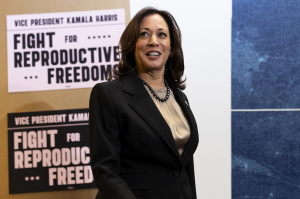When politics trumps faith

Over the past few years there has been an alarming trend. It’s something that I’ve noticed since the mid-80s, but it has been becoming less subtle and more strident as the years have progressed. For the next few moments I’d like to discuss something that will, in all likelihood, alienate at least a few readers and perhaps will even cause some anger.
I’m not sharing these thoughts lightly, and in fact this is an article that I have started to write several times over the past couple of years and each time dissuaded myself from doing so since it will certainly be a contrarian viewpoint, at least among my circle of pastors, friends, and acquaintances.
The theme, simply stated, is this: have we allowed politics to trump faith?
I recognize the question has a double meaning, and that’s not completely by accident but is not specifically the topic although it may be an example.
It seems as though throughout western culture, and particularly in the United States of America, there has been a move towards people of faith becoming increasingly polarizing in their political statements. It’s not just the statement of a political view, but the statements – on either side of the issues – seem to be attempting to outdo one another in their imprecations of those who may have a differing viewpoint.
How is it that people of faith are becoming more known for their political statements and alienating political viewpoints than they are for their relationship with Jesus Christ?
Every few years a series of political figures sashay across debate stages, all proclaiming to be people of high moral character and often naming the name of Christ. Inevitably one will rise above the others and then various religious leaders and high-profile faith voices will begin to offer their support for the respective candidate, claiming that they have discussed religious and biblical topics with this individual and they are convinced that this is a person of great faith. We’ve witnessed various groups coming together for prayer over these political figures, espousing their candidacy from pulpit and pen, from news interviews to political rally stages – and all the while ignoring the often enormous evidence that this is a person who has lived their life (and continues to do so) far outside of the teachings of Jesus. Often these individuals will mock the very things that people of faith hold dear while attempting to somehow still appeal to them for their vote. And all too often various people groups will ignore their faith, ignore the principles and precepts of Scripture, ignore the teachings of Jesus, ignore their own moral convictions, and they will pragmatically vote for the “lesser of two evils.” They will justify their choice by claiming that they didn’t vote “for” this candidate but rather really voted “against” the other.
And then the politicization of faith really begins because they now attempt to defend their choice by appealing to faith tradition, ancient church fathers, or even pulling Scripture out of context to assuage the concerns of their constituents and congregations by telling them that what they did was morally pleasing to God and was spiritually palatable.
And now these religious and faith leaders are suddenly known more for their political affiliations and viewpoints than they are for naming the name of Christ and holding out hope for a lost world.
I know that by this point some of you are pushing back strongly against my topic and are forming defenses in your mind to justify such a set of circumstances and actions. I get it. It’s human nature to assume that we are right and any viewpoint contrary to our own is incorrect.
But if you will stick with me for another moment, I’d like to invite you to consider a Scriptural application with me and see what we might learn from it.
In Jesus’ day there were several cultural issues that we would have significant problems with today. In fact, some of these issues have been the point of discussion and even ridicule by those outside of Christendom, ostensibly pointing to the acceptance of these problems by Christ, the Apostles, and early church leaders.
I won’t go into all of the various Roman cultural practices that would be contrary to the teaching of Christ, but one seems to come to the front more often than some of the others, so I’ll use it as our example.
Consider the issue of slavery in the New Testament.
Now we’re not talking about Old-Testament-Ten-Commandments-Moses-on-Mount-Sinai here, this is New Testament time-of-Christ stuff.
Did Jesus and the early church approve of slavery?
Considering their teachings, no they did not. This statement from the Apostle Paul shows how the early church viewed and valued all individuals.
Galatians 3:28
There is neither Jew nor Greek, there is neither slave nor free, there is no male and female, for you are all one in Christ Jesus.
In other words, he was saying everyone was treated the same. The old barriers were broken down in the name of Jesus.
But, at the same time, they also did not teach, organize or protest in an attempt to change the practice of slavery in their culture.
The same Paul who wrote Galatians also penned the book of Philemon. Philemon was a slaveowner who was also a Christian, as incongruous as that may seem to our modern minds. Paul, in writing to Philemon, instructs Philemon how to be a good and godly slave owner and that he is to treat Onesimus (a runaway slave who fled to the Apostle Paul for sanctuary) as a Christian brother. Yet Paul does not denounce the institution of slavery, even in principle. He doesn’t tell Philemon that it is improper for him to own another person.
No, what Paul does is address the situation as it exists within his culture.
Philemon 1:8-16
Accordingly, though I am bold enough in Christ to command you to do what is required, yet for love’s sake I prefer to appeal to you—I, Paul, an old man and now a prisoner also for Christ Jesus— I appeal to you for my child, Onesimus, whose father I became in my imprisonment. (Formerly he was useless to you, but now he is indeed useful to you and to me.) I am sending him back to you, sending my very heart. I would have been glad to keep him with me, in order that he might serve me on your behalf during my imprisonment for the gospel, but I preferred to do nothing without your consent in order that your goodness might not be by compulsion but of your own accord. For this perhaps is why he was parted from you for a while, that you might have him back forever, no longer as a bondservant but more than a bondservant, as a beloved brother—especially to me, but how much more to you, both in the flesh and in the Lord.
He doesn’t attack the political system, the culture, or the system of slavery. Instead he instructs Philemon, using Christ-like principles, on how to treat his slave and by so doing turns the institution on its ear. Paul did not address the cultural situation at all but rather instructed Philemon on how to behave in a Christ-like manner within that cultural situation.
Donald Guthrie, in his New Testament Introduction, has this to say about Paul’s attitude and instructions:
It is clearly incongruous for a Christian master to “own” a brother in Christ in the contemporary sense of the word, and although the existing order of society could not be immediately changed by Christianity without a political revolution (Which was clearly contrary to Christian principles), the Christian master-slave relationship was so transformed from within that it was bound to lead ultimately to the abolition of the system.
Now, with that as an example, consider our world today.
Think of any cultural hot button issue and the reaction among many in faith circles is often the same – protest, espouse a political candidate that will promise to overturn the problem, try to achieve the desired outcome through the courts, or vigorously proclaim their political aspersions and opinions throughout the news media or the various social media channels.
That’s not to say there aren’t many things within our culture that need to be addressed! Considering the example I used from Scripture a moment ago, human trafficking is an escalating problem that needs our attention quickly.
But the political system will never be able to stop it.
Politicians are not the answer. It doesn’t matter how good the politician is or what laws are passed, human trafficking will continue to be a problem. No political statement, legal opinion, law, or executive order will be sufficient to eliminate the menace of enslavement and trafficking in men and women, boys and girls.
Another cultural hot button issue is gun control and mass murder. Mass shootings are a blight on the contemporary American landscape that need to be addressed.
But the political system will never be able to stop people killing other people. If it’s not guns, it will be buses or planes or box trucks filled with fertilizer.
Politicians are not the answer. It doesn’t matter who the politician is or what laws are passed, evil people will continue to kill people.
I could continue listing the ills of our contemporary society, but you get the picture.
Politics will never solve the issues that face us.
Only Jesus Christ can solve these issues. Only the love of Christ can change the heart of the trafficker or the murderer.
And yet we continue to see faith leaders cozy up to politicians as if this politician will be able to solve the problems, all the while ignoring the ungodly habits, attitudes, and actions that this person brags about on any given opportunity. Pastors and other religious influencers are known less and less for their pulpit and more and more for their politics.
Politics isn’t the answer.
Oh, by all means go vote as you will.
Contribute financially to a political campaign if you so choose.
But I believe it’s time for men and women of faith to stop being pragmatic about our political choices and instead focus on lifting the name of Jesus up before a world that is increasingly darker.
The people who do not have faith are watching those who claim to honor the Bible and follow Christ support political leaders who live lives that are anything except godly.
And rather than being attracted to the love of Christ and the power of His Holy Spirit evident within the lives of those people of faith, they are repulsed by what they view as blatant hypocrisy.
I believe it is time for Christians to start acting as though Jesus is the answer.
Stop letting politics trump your faith.




























